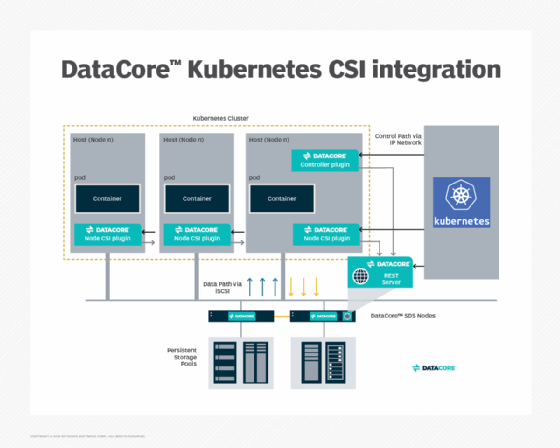
GP - Fotolia
DataCore storage gets Kubernetes and Docker plugins
New DataCore plugins for Kubernetes and Docker will help customers developing container-based applications and microservices to access its software-defined storage products.
DataCore Software is adding Kubernetes and Docker software plugins to help customers developing containerized applications gain access to storage managed by its software.
DataCore representatives estimated less than 10% of the 10,000-plus DataCore storage customers use containerized applications in production. But DataCore surveys indicated a substantially higher percentage of current and prospective customers are testing or considering container deployments.
According to DataCore research, container users are now focusing on stateful workloads for containers, spurring the need for the Kubernetes and Docker plugins.
Steven Hunt, a director of product management for DataCore storage, based in Ft. Lauderdale, Fla., said the Kubernetes and Docker plugins initially could hold the greatest appeal for the storage vendor's growing customer base in the financial and technology industries. He said the larger number of customers in the healthcare and manufacturing sectors would tend to be slower to adopt containers.
DataCore's SANsymphony and Hyperconverged Virtual SAN customers with current support contracts can get the Kubernetes CSI plugin on GitHub and the Docker-certified plugin via Docker Hub at no charge. DataCore storage supports iSCSI and Fibre Channel access to volumes. The vendor plans to release a volume plugin for Windows environments, likely through GitHub, when there is enough interest among customers moving Windows-based applications to a container-based architecture.
Access to DataCore storage capabilities
DataCore Software developed the Kubernetes plugin to conform to the base container storage interface (CSI) specification designed by the Cloud Native Computing Foundation's storage working group. Hunt said DataCore storage can differentiate its Kubernetes support through its storage capabilities, such as continuous data protection.
Plugin users can request a persistent storage volume at a particular size and read-write requirement based on a DataCore template. The software provisions a new virtual disk on the back end that will give the containerized applications and microservices access to the same storage features that virtual machine and bare-metal server deployments use.
"What we're seeing in some institutions is they've been using DataCore in their tier-one, mission-critical commercial apps, and perhaps the DevOps team is just starting to get into containers. Rather than have to stand up different persistent storage for that DevOps team, they can tap into the same resources," said Augie Gonzalez, director of product marketing for DataCore.
Although other storage software vendors already support containers and orchestration engines, DataCore waited for the finalization in late 2018 of the Kubernetes CSI v1.0.0 specification supported in Kubernetes 1.1.3. DataCore's Docker-certified plugin supports the Docker volume plugin specification.

Standard mechanism to access data storage
Julia Palmer, a Gartner analyst, said the Cloud Native Computing Foundation's CSI offers hope for a standard mechanism to expose external storage to containerized workloads. It follows a series of failures in the storage ecosystem, such as ClusterHQ's Flocker and Dell EMC's REX-Ray. She said a major advantage of the CSI is storage vendors can develop their volume plugins independently of each container orchestrator release, offering the potential for faster development and bug fixes.
Standards-based CSI plugins should also offer benefits to end users, including easy setup and seamless integration, Palmer said. And container users could minimize the risk of vendor lock-in and more easily migrate from one storage product to another if all the providers have standard CSI plugins, with nothing else changing, she said.
Palmer said user interest is highest in Kubernetes, but the CSI is designed to work with other container orchestrators, as well as multiple storage systems. In addition to DataCore, vendors with CSI-based plugins include NetApp, Nutanix, Portworx, Robin Systems and StorageOS, she said. Palmer noted her advice to users is to select hardware-agnostic and API-driven storage products that support a distributed architecture and edge-core and public cloud deployments to align with Kubernetes design principles.





